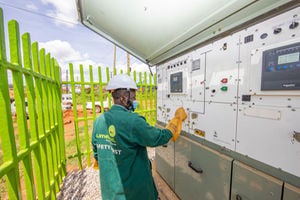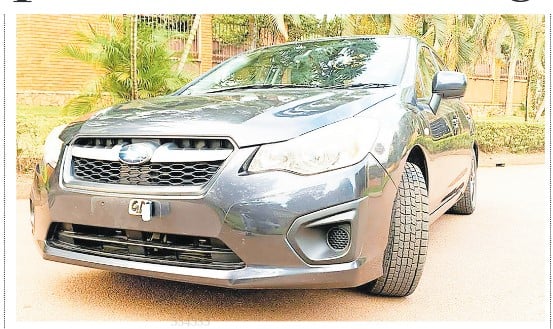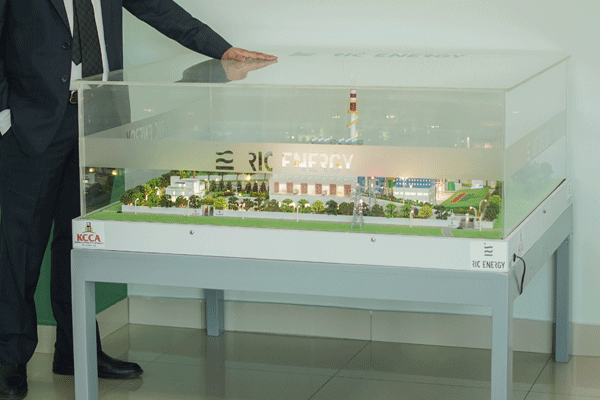
Uganda's Electricity Regulatory Authority Chief Executive Officer (CEO) Eng. Ziria Tibalwa Waako. PHOTO/COURTESY
You wake up, and it hits you—this dream is yours to chase. Like any die-hard capitalist would say, "You're the master of your destiny." That's the mantra that drives many, pushing them to scale every peak, conquer every goal. Engineer Ziria Tibalwa Waako is one of those people.
As the chief executive officer of Uganda's Electricity Regulatory Authority (ERA), she’s quietly impressive, eloquent, and refreshingly low-key—not your typical business leader, wrestling to show off the hustle.
We met on Tuesday at Kampala’s Imperial Royale Hotel, and even in the brief window she could spare, her insights sparkled. Eng Waako’s hands are full, to say the least. Her team is poring over a colossal 283-page proposal from Uganda Electricity Distribution Company Limited, angling to take over electricity distribution nationwide as Umeme’s contract naturally sunsets in March 2025.
The government, spearheaded by President Museveni, made the call not to renew Umeme’s concession, frustrated by what many felt was a raw deal, keeping electricity tariffs sky-high. The countdown to change is now ticking, and Eng Waako is making every second count.
Uganda’s power landscape is complicated. With a mix of costly and cheaper energy sources, the blend results in high tariffs, and although the country generates surplus power, we still pay for what we don’t use. Now, as Umeme Limited’s nearly 20-year concession nears its natural end in March 2025, Uganda Electricity Distribution Company Limited (UEDCL) has submitted its application to take over.
Their proposal, already under review by ERA, includes new performance standards aimed at bringing down tariffs. Eng Waako explains: “Everything we’re doing now impacts the end-user tariff. The Electricity Act empowers us to approve rates and oversee charges for electricity services, from generation to export.”
In a broader move to streamline energy services, the government has plans to consolidate UEDCL, UETCL, and UEGCL into a single entity. This merger, announced in February 2022, is aimed at ramping up efficiency, expanding electricity access, and lowering tariffs to fuel industrial growth.
“Second-generation” reforms
This surfaced under the new generation reforms approved by the Cabinet that mandated non-renewal of private electricity concessions, including Umeme’s. The executive branch decided to create the Uganda National Electricity Company (UNEC) while officially ending private concessions in the sector.
Backing these “second-generation” reforms, the government secured $638 million from the World Bank for the Electricity Access Scale-up Project (EASP), designed to bring power closer to the people. ERA Waako explains some of these recent initiatives. Among them: a subsidized “clean cooking” tariff that promotes cooking with electricity—setting rates at Shs412 per kWh for homes and Shs451.4 for institutions.
For industries, ERA has rolled out a “declining block tariff,” lowering the marginal cost for high-consumption factories to enhance competitiveness.
“We’ve implemented a demand-growth-based tariff reduction,” Eng Waako adds. “Hit the target, and your tariff decreases, making your products more competitive.”
Since the 2022 amendment of the Electricity Act, ERA has made strides in applying the new law (now Chapter 157) and has opened avenues for private investment in transmission. As of October 2023, applications from investors like Amari Power and RAREH Kapterol Transmission Company Limited are underway, with projects aimed at upgrading substations across Uganda, from Tororo to Moroto, to better connect the nation.
This proposed transmission line will weave through Bulambuli, Kween, Nakapiripirit, Amudat, and Moroto districts, serving a dual purpose.
“It’s crucial—it powers … Karamoja for mineral value addition and connects mini-hydro plants across greater Mbale and planned solar projects in the Elgon region,” explains Eng Waako.
ERA has also finalised regulations for direct electricity purchase, allowing certain consumers to buy directly from suppliers. Under this framework, Munyenye Solar Company now sells directly to Nile Breweries in Buikwe and Mbarara, a first for the industry.
Preparing for Umeme’s contract to end in 2025, ERA is working with consultants on future tariff standards. They’ve also funded distribution companies to upgrade prepaid meters, surpassing their November 2024 deadline. “Remember the buzz about meter upgrades?” Eng Waako says. “Our teams are ahead of schedule.”
And in a major regional role, Uganda now hosts the Eastern African Power Pool’s independent regulatory board (IRB), chaired by ERA and led by Eng Waako as its inaugural CEO. Hosting the IRB in Uganda, Eng Waako believes, could be transformative. Beyond fostering a secure power supply, it positions Uganda to help build an efficient, reliable East African electricity market. ERA's regional offices, opened in Gulu and Mbale in June 2024, are part of extending their reach for better service delivery nationwide.
Bottlenecks
Challenges persist, however. Vandalism of electrical infrastructure—costing the sector up to Shs400 million—drives up maintenance costs, impacting tariffs.
"Every time someone vandalises infrastructure, it’s like they’re taking money straight from your pocket,” she explains, calling for public vigilance. The regulator now collaborates with Uganda Police, the UPDF, and locals to combat these incidents, supplementing with robust monitoring tech and community outreach.
Looking ahead, ERA has a bold agenda. They’re prioritising tech adoption, such as the internet of things, Artificial Intelligence (AI), and smart grids, to build resilient, self-healing systems that will boost efficiency and reliability. The authority will also focus on rural electrification, aiming for universal access by 2030, alongside tariff reductions, aiming for five cents per kWh for manufacturers to lower costs across the board.
With these reforms, ERA hopes to balance financial sustainability, sector performance, and environmental responsibility, ensuring Uganda’s energy sector stays resilient and competitive.
“Many times, it appears like we are only focusing on the manufacturers, large and extra-large, but they are an input to the economy. They are an input to increase job creation. They are inputs to increase productivity, and once they increase the guzzling of energy, then the additional revenue that we make as a sector goes towards reducing the tariffs for the sectors that are not productive—domestic and alike,” Eng Waako says.
Uganda’s electricity supply industry is setting global standards. Not only has ERA been recognised as Africa’s top regulator, but Uganda also boasts the only financially viable distribution company on the continent. This has attracted partnerships with the World Bank and African Development Bank, extending Uganda’s influence and expertise beyond borders.
Who is Eng Waako?
Eng Waako is a passionate leader with a remarkable academic journey that began at Iganga Secondary School, where she aimed to excel in the science subjects that were once considered the hallmark of intelligence.
She didn’t just meet those expectations—she surpassed them, earning top marks in Physics, Chemistry, and Mathematics. This foundation led her to Kyambogo Polytechnic, where she earned a higher diploma in electrical engineering.
Her ambition didn’t stop there; she pursued both a Bachelor’s and Master’s degree in electrical engineering at Makerere University and later obtained a Master of Business Administration in Leadership from Walden University in the USA.
Eng Waako’s brilliance is evident to anyone who knows her, whether personally or professionally.
She attributes much of her success to the guidance of esteemed mentors like the late Dr MK Musaazi, Dr V Kasangaki, Eng E Kiyemba, Dr K Kabagambe, Prof E Lugujjo, Prof Tusubira, and Dr Mutambi, who supported her early career.
With over 30 years of experience in Uganda’s electricity sub-sector—15 of which have been in senior management—Eng Waako is a registered engineer with the Uganda Institute of Professional Engineers and the National Engineers Registration Board. She is also a member of the Institute of Electrical and Electronics Engineers (IEEE) based in New York.
In 2019, she received the Excellent Performance Engineers Award from the National Engineers Registration Board during its 50th Anniversary celebrations.
Under her leadership, ERA has garnered numerous national and international accolades, solidifying its reputation as a benchmark in the industry.







